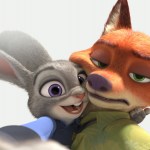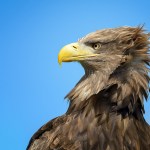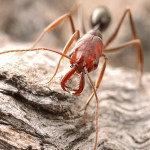predators
Would it surprise you to learn that the top movie at the North American box office, a computer-animated family film made for children, is a nakedly racist allegory, a celebration of the urban police state, and an insult to the entire animal kingdom and the natural world at large?
The premise of Zootopia is simple: a country bunny named Judy (yes, she's a rabbit) leaves her parents and her hundreds of siblings behind for a life in the big city. The difference between rural and urban living is the first ugly dichotomy the film establishes: farming carrots with your family is framed as a dead-…
You can almost hear the sound of PZ Myers' palm hitting his face as "a couple of vegetarian philosophers with no knowledge of biology" urge humanity to end predation worldwide—so that no more zebras have to suffer at the fangs of a lion, and no more mice at the talons of an owl. Their plea on behalf of prey species, inspired by the model culling of Cecil the lion, calls carnivory simply 'unnecessary;' PZ writes, "it’s as if they are completely unaware of the fact that predation maintains and increases biodiversity, or that there’s more to wildlife than mammals and birds, or that life is a…
...because badass mandibles are in style this season:
Odontomachus turneri, Australia
photo details:
Canon EOS 50D camera
Canon MP-E 65mm 1-5x macro lens
ISO 100, f/13, 1/250sec
The streams of Trinidad and Tobago are home to the most unexpected of landscape gardeners. They're guppies - tiny and beautifully coloured fish, just an inch or so long. Without tools or plans, they shape the environment around them, tweaking everything from the numbers of different species to the nutrients in the water.
The guppies are quick to adapt to different environments and particularly to which predators are around. The number and types of predators affect the guppies' lifespan, how big they get and when they become sexually mature. This, in turn, affects what they eat, and that…
I've just flown from London to North Carolina, a trip of around 6,200km. As flights go, it's a pathetic one, a mere jaunt in the park compared to the epic voyage of the Arctic tern. Every year, this greatest of animal travellers makes a 70,000 km round-trip, in a relentless, globe-trotting pursuit of daylight. In summer, it spends its time in the sun-soaked Arctic and in winter, it heads for the equally bright climes of Antarctica. In its 30 years of life, this champion aeronaut flies more than 2.4 million kilometres - the equivalent of three return journeys to the Moon.
The…
As a species, our unflinching obsession with size is just as apparent in our dealings with other animals as it is in our personal lives. Fishermen prize the biggest catches and they're are obliged to throw the smallest specimens back in. Hunters also value the biggest kills; they provide the most food and make the flashiest trophies. This fixation isn't just a harmless one - by acting as a size-obsessed super-predator, humans are reshaping the bodies of the species we hunt, at a remarkable pace and to a dramatic degree.
Predators already put a lot of pressure on their prey to evolve new ways…
Phymata ambush bug - Champaign, Illinois
photo details: Canon MP-E 65mm 1-5x macro lens on a Canon 20D
ISO 100, f/13, 1/250 sec, flash diffused through tracing paper


